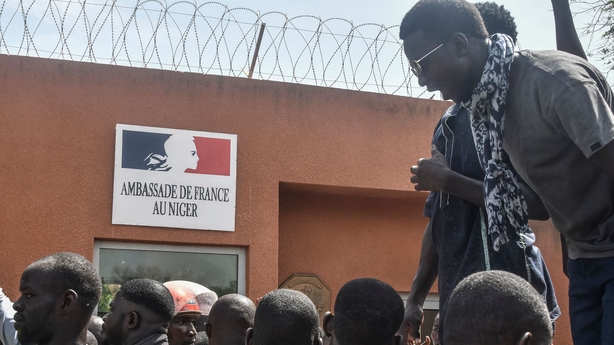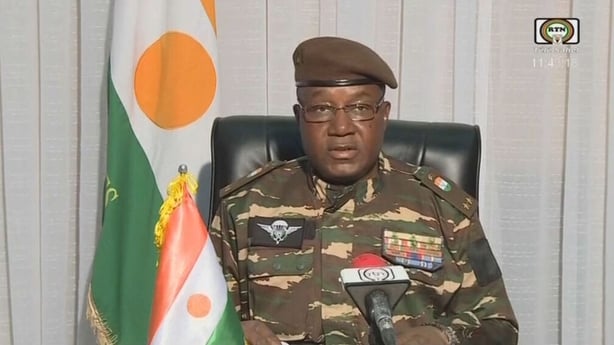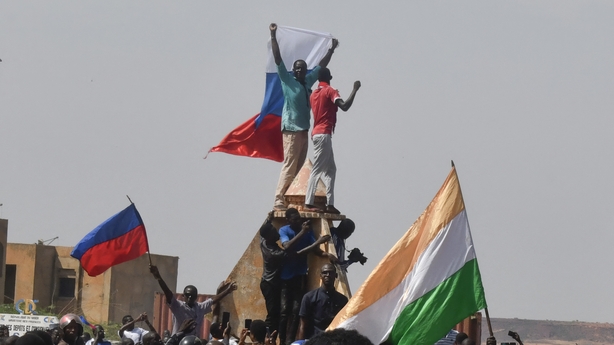France and Italy are preparing to fly out their citizens and other Europeans from Niger, six days after a coup toppled one of the last pro-Western leaders in the jihadist-plagued Sahel and stoked anti-French demonstrations.
In the region's third military takeover in as many years, President Mohamed Bazoum was overthrown by his own guard, triggering alarm bells in France, Niger's former colonial power and traditional ally.
After hostile crowds gathered on Sunday outside the French embassy and Niger accused France of plotting to intervene militarily, Paris said today it would withdraw citizens and offered to evacuate other Europeans as well.
"In the face of a deteriorating security situation in Niamey and taking advantage of the relative calm in Niamey, an operation of evacuation by air is being prepared," the embassy told French citizens.
The evacuations "will take place very soon in a very limited span of time," it said.
The initiative marks the first time that France has staged a large-scale evacuation in its former colonies in the Sahel, where there have been coups in Mali and Burkina Faso since 2020.
The German ministry urged "all German nationals" to take up the French evacuation offer. It said that fewer than 100 German civilians were believed to be in Niger.
In Rome, the government said it was putting on a "special flight" for Italians wishing to leave the country. Around 90 Italians are in Niamey, out of nearly 500 across the country, it said.
A first French plane later took off for Niamey, said a French source involved in the operation.
Another source said France would be using unarmed military transporters, capable of taking more than 200 people.
The French foreign ministry said about 600 French nationals were in Niger.
Around a hundred of them carrying only light luggage gathered this afternoon at Niamey's Diori Hamadi international airport, where Nigerien police and about 20 French soldiers were deployed.
But several French citizens told journalists they did not want to leave Niger immediately.
"I'm staying for the time being," said one man who said he could only speak anonymously, under orders from his aid organisation employers.
"We don't have a problem with the French" or Europeans, said a Nigerien named Hamidou Ali, aged 58.
"We have a problem with European governments."
But student Mahamadou Issoufou Idi said, "The French should leave -- we no longer need them".

The Department of Foreign Affairs has advised Irish citizens not to travel to Niger until "the situation is resolved".
In a statement, the DFA said there is a high risk of violence in the country.
The DFA said: "Citizens should be aware that violent armed groups, including terrorists, are currently active outside of the capital Niamey, and we advise against all travel to Agadez and Diffa regions, as well as to border areas with Algeria, Benin, Burkina Faso, Libya and Mali."
It is advising Irish citizens in the country to be vigilant, avoid unnecessary journeys and keep up with local developments.
The department is also advising people to stay away from demonstrations and large gatherings and consider stocking up on food, water and fuel.
It said citizens in Niger should ensure they have registered with the DFA.
The department added any Irish citizens in need of consular assistance should contact the Irish Embassy in Nigeria at 00234 9 462 1080 or contact the Consular Assistance Unit at 00353 1 408 2000.
The West African bloc ECOWAS on Sunday slapped sanctions on Niger and warned it may use force as it gave the coup leaders a week to reinstate Mr Bazoum.
The following day, the junta accused France of seeking to "intervene militarily", a charge which drew a French denial, while junta-ruled Mali and Burkina Faso warned any military intervention in Niger would be a "declaration of war" against them.
The events are unfolding in one of the world's poorest and most unstable countries, a vast semi-desert nation that had already experienced four coups since independence in 1960.
President Bazoum was feted in 2021 after winning elections that ushered in Niger's first-ever peaceful transition of power.
But his tenure was already marked by two attempted coups before last week's dramatic events, in which he was detained by members of the elite Presidential Guard.
Guards chief General Abdourahamane Tiani has declared himself leader, but his claim has been rejected internationally, from ECOWAS, the African Union and the UN to France, the United States and the European Union.
According to Mr Bazoum's PNDS party, the junta has arrested the country's oil, mining, interior and transport ministers, the head of the PNDS's executive committee, and a former defence minister.
The coup has worried Western countries struggling to contain a jihadist insurgency that flared in northern Mali in 2012, advanced into Niger and Burkina Faso three years later and now overshadows fragile states on the Gulf of Guinea.
An unknown number of civilians, troops and police have been killed across the region, many in ruthless massacres, while around 2.2 million people in Burkina Faso alone have fled their homes. The economic damage has been devastating.
France had at one point 5,400 troops in its anti-jihadist Barkhane mission across the Sahel, supported by fighter jets, helicopters and drones.
But that mission was drastically refocused on Niger last year when France pulled out of Mali and Burkina Faso after falling out with their juntas.
Today's reconfigured French force has 1,500 men, many deployed at a major air base near Niamey, while the United States has an important air base in Niger and 1,100 personnel.
In all three Sahel countries, the disgruntled military intervened against elected presidents as the toll mounted from jihadist attacks.
The takeovers have been accompanied by nationalist rhetoric and strident anti-French, pro-Russian demonstrations.
French Foreign Minister Catherine Colonna told BFM TV last night that the protest in front of the embassy and the ensuing accusations that France shot at the crowd - which it denies - "have all the usual ingredients of destabilisation, the Russian-African way".
Yevgeny Prigozhin, the head of Russia's Wagner mercenary group, last week welcomed the coup in Niger, and said his forces were available to restore order.
The Kremlin said that the situation in Niger was "cause for serious concern" and called for a swift return to constitutional order.

The coup has raised fears for the security of the Sahel region, where groups linked to the so-called Islamic State and al-Qaeda have been gaining ground for years.
Niger is the world's seventh-biggest producer of uranium, the radioactive metal widely used for nuclear energy and treating cancer.
Meanwhile, a United States official said the coup had not been fully successful and that there was still an opportunity to reinstate Mr Bazoum.
France and Germany echoed those comments.

There have been four takeovers in neighbouring Mali and Burkina Faso during the last two years, all of which have come amid frustrations about growing insecurity.
Both countries have turned increasingly towards Russia as an ally.
The coup leaders, who have named General Abdourahamane Tiani, the former presidential guard chief, as head of state, said they overthrew Mr Bazoum over poor governance and discontent with the way he handled the Islamist threat.
Economic pinch
ECOWAS appears to have taken a tougher stance towards Niger than its junta-led neighbours, which have been sanctioned but never threatened with force.
Both the EU and France have backed the bloc's response and suspended their own financial support, while the US has threatened to do so.
"The EU and Niger share deep ties developed over decades," European Commission President Ursula von der Leyen posted on X, the platform formerly known as Twitter.
"The unacceptable attack on the democratically elected government puts these ties in jeopardy," she added.
After days of turmoil, the International Monetary Fund (IMF) said it was closely monitoring developments in Niger.
However, the IMF has not yet taken any specific actions in response to the coup.
It has yet to disburse a $131.5 million (€119 million) loan to Niger that was approved on 5 July, it added.
The regional central bank has meanwhile cancelled Niger's planned 30 billion CFA (€46 million) bond issuance, scheduled for today in the West African regional debt market, following sanctions, sources said.

